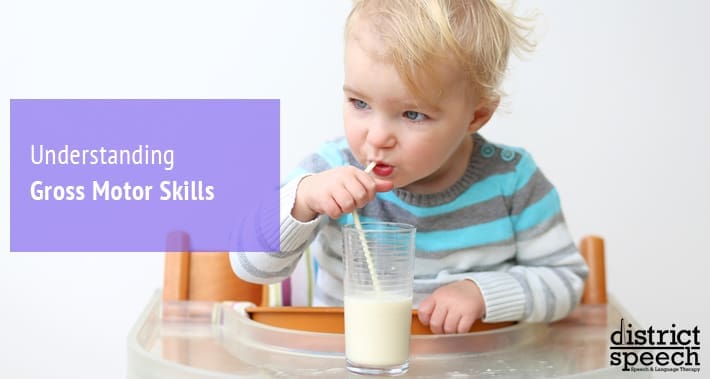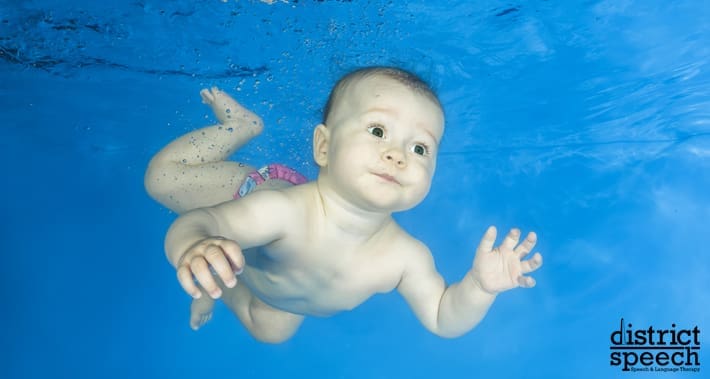
Most people have heard the term “gross motor skills” before.
But not everyone fully understands the inner workings of their gross motor skill function.
So, what exactly are gross motor skills?
Your gross motor skills refer to an incredibly vast range of bodily movements.
As the name suggests, they involve the large muscles of your body, such as the muscles in your arms, legs, and torso.
Children develop their gross motor skills throughout their formative years.
Gross motor skills milestones are general guidelines that mark important stages throughout childhood development.
RELATED: Important Pediatric Physical Therapy Milestones
These milestones begin as young as 2 months of age.
On the chance your child is dealing with a developmental delay, physical therapy for babies and pediatric speech therapy are two very important resources.
At District Speech, our physical and speech therapists work collaboratively to ensure your child gets the support they need to overcome their challenges.
Now, let’s find out more.
What Are Gross Motor Skills?
Gross motor skills utilize the large muscles in your torso, arms, and legs to preform a wide variety of physical tasks.
Examples include walking, running, or throwing a ball.
Typically, they involve whole body movements and are a requirement for any type of physical activity, like jogging or raking the leaves.
Gross motor skills come naturally to most people, but they are more complex than what meets the eye.
This fact becomes especially apparently when you dive into their mechanics.
This is because they involve the precise coordination of your muscles and your neurological system.
RELATED: Science Hour: A Brain Process That Impacts Language!
Gross motor skills also impact other abilities, including:
- Balance
- Coordination
- Physical strength
- Body awareness
- Reaction time
How Do Gross Motor Skills Develop?
Gross motor skills begin developing during infancy and continue throughout childhood.
It’s important to note that all children develop at their own pace.
Just because your child’s walking skills are slightly delayed compared to their peers doesn’t mean they’re experiencing a developmental delay.
That being said, there’s certain milestones that most children typically reach around a certain age.
These are called gross motor skills milestones.
Gross Motor Skills Milestones
Gross motor skills milestones are general abilities that are typically reached at certain ages throughout childhood development.
For example, most children can jump with two feet by the age of 3.
In the next section, we’ll take a closer look at some of the gross motor skill milestones you can watch out for in your child.
By 2 Months
By 2 months of age, babies can typically:
- Push up with their arms and lift their head while laying on their belly
- Make deliberate movements with their arms and legs
- Move their head from side to side
- Kick their arms and legs while laying on their back
- Participate in tummy time on the floor
By 4 Months
By 4 months of age, babies can typically:
- Hold their head upright
- Bear weight on their legs while their feet are flat on the floor
- Push up from their stomach to their elbows while laying on their belly
- Roll over from their belly to back
By 6 Months
By 6 months of age, babies can typically:
- Sit upright without support
- Rock back and forth on their hands and knees
- Move objects from one hand to the other
- Crawl on their belly
By 9 Months
By 9 months of age, babies can typically:
- Creep, crawl, and scoot
- Pull themselves up to a standing position
- Point at objects
- Reach and grab for toys
- Pick up small pieces of food
By 1 Year
By 1 year of age, children can typically:
- Drink from a sippy cup
- Shake and throw objects
- Stand with support
- Walk a few steps with support
RELATED: How To Teach Your Baby To Walk
By 18 Months to 2 Years
Between 18 months and 2 years, children can typically:
- Walk forward and backward
- Run
- Use utensils to eat
- Hold a marker or crayon
- Throw a ball
- Walk up and down stairs while holding a railing

Conditions Associated With Gross Motor Skills
Poor gross motor skills can impact your child in all aspects of their lives.
It can make school and home tasks more challenging, and ultimately lead to poor self esteem.
RELATED: Can Speech Therapy Improve Mental Health?
Poor gross motor skills are sometimes associated with or caused by particular developmental conditions.
Let’s find out more about which conditions can impact your gross motor skills.
1. Autism Spectrum Disorder
Autism spectrum disorder is a condition often associated with gross motor skills difficulty.
RELATED: Frequently Asked Questions About Autism Spectrum Disorder
According to a 2022 study by Posar and Visconti, gross motor skill difficulties are often one of the earliest symptoms of autism.
These difficulties can manifest in a variety of ways, including:
- Atypical gait
- Fine motor skill difficulties, such as poor handwriting
- Difficulty coordinating movements between the right and left side of the body
- Difficulty maintaining posture or balance
It’s worth mentioning that these symptoms occur distinctly and separate from the repetitive behaviors often associated with autism.
Speech therapy and physical therapy for autism at District Speech can help your autistic child flourish in school and beyond.
2. Learning Disabilities
Learning disabilities are defined as a group of similar neurological disorders which manifest differently during the life span of the individual.
RELATED: Signs Of A Learning Disability Throughout Your Child’s Development
They can impact your child’s reading, writing, and communication skills.
These disorders are typically developmental in nature and often include a variety of skill delays, including gross motor skills.
Speech therapy for learning disabilities at District Speech can help.
3. Down Syndrome
Down syndrome is a congenital disorder which occurs when there is an extra copy of chromosome 21 made during chromosomal development.
Individuals with Down syndrome commonly have generalized low muscle tone, which occurs when the length of the resting muscle is longer than normal and causes the floppy and weak feeling muscles.
Generalized low muscle tone can also cause poor gross motor skills.
This is one of the primary focuses of pediatric physical therapy treatments for Down syndrome
4. ADHD
Attention deficit hyperactivity disorder, or ADHD for short, frequently occurs alongside autism and shares many behavioral characteristics.
RELATED: Frequently Asked Questions About ADHD
They also share many gross motor symptoms.
According to a 2019 study by Mokobane et al., children with ADHD commonly struggle with motor control and function.
Other symptoms of ADHD include inattention, hyperactivity, and impulsivity.
Like autism, physical therapy and speech therapy for ADHD can greatly improve these symptoms.
How Can A Speech Therapist Help?
A speech therapist can help your child with their gross motor skills at any age that gross motor skills difficulties present.
Your speech therapist will examine risk factors, conduct systematic observations, assess their developmental status and create a varied learning plan to provide therapy based on their assessment data.
In addition, your speech therapist will link their therapy activities to your family activities and school curriculum so that your child continues to develop beyond each session.
The goal is functional progress that can continue across every aspect of your child’s life.
How Can A Physical Therapist Help?
Like your speech therapist, your physical therapist will first evaluate your child to determine the extent of their strengths and weaknesses according to the general milestones described above.
Then, they will give detailed instructions on building motor skills in order to reach an established goal.
This can include physically guiding your child’s movements, providing cues to teach new directions of movement, and experimenting with different types of supports to facilitate learning new movements.
Like your speech therapist, your physical therapist will connect these activities to your child’s home and school life in order to maximize their potential for progress.
Book Your Appointment With District Speech Today
As you can see, there’s a lot that goes on behind the scenes of gross motor skills.
They can be tricky to understand and can both benefit by speech therapists and physical therapists.
At District Speech, we have accomplished physical therapists and speech therapists that can help your child to develop their gross motor skills at any age.
Book your appointment with District Speech today and watch your child flourish.
1300 I St NW, Suite 400 E,
Washington, DC 20005
- https://g.page/districtspeech
District Speech and Language Therapy specializes in speech therapy, physical therapy, and occupational therapy solutions, for both children and adults, in the Washington D.C and the Arlington Virginia areas.